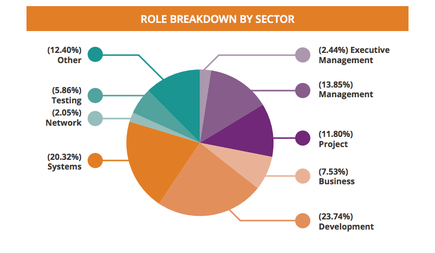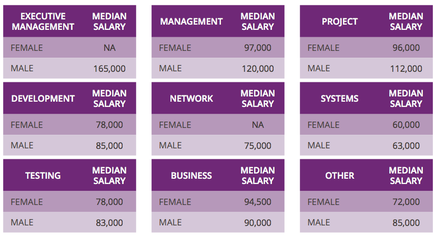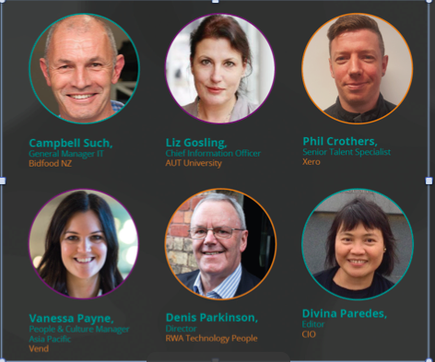We looked at a broad range of data to answer some key questions like what role are you in? How much money do you make? What motivates you at work? Are you happy in your current role?
A new survey reveals the average Auckland IT professional earns $86,000 per year in a permanent role and $80 per hour as a contractor.
When they reach executive level - chief information officer and chief technology officer - the median salary is $165,000 plus a raft of benefits and bonuses.
The inaugural Auckland IT Salaries Report by RWA Technology People confirms the lucrative pay of nine areas of work in the sector, while providing more details on the gaps that need to be filled.


Denis Parkinson, RWA director, says there is no other comprehensive report in Auckland that is geared specifically towards IT and the qualitative aspects of the work, which include job satisfaction.
“We looked at a broad range of data to answer some key questions like what role are you in? How much money do you make? What motivates you at work? Are you happy in your current role?”
RWA surveyed more than 2300 Auckland IT professionals from across a range of roles, organisations and sectors, between October 2016 and March 2017. The report covered full-time salaried employees and contractors.


Mind the gaps
One of the most concerning statistics of the report is around women ICT professionals, says Parkinson.
IT is an an industry skewed towards men, with less than 19 per cent of respondents identifying themselves as women, he states.
The report notes how the sector has struggled with creating pathways for women, with many programmes being put in place in recent years to help facilitate this.
However, the survey data suggests this imbalance is even more prevalent than expected in Auckland ICT.
Though women are traditionally underrepresented in IT, RWA did not receive a single female respondent in the executive management (CIO and CTO) bracket.

Despite the steps taken by many organisations to increase diversity in the IT sector, it seems the Auckland market still has a lot of work ahead of it in building a fair and equitable workplace where opportunities exist for everyone
The report finds just 13 per cent of other management roles were held by women.
But the number of positions held isn’t the only area where women were disadvantaged.
“In every role group except business, (which are primarily business analysts) women received a lower median base salary when compared with their male counterparts,” Parkinson states.
Women were being paid 5.85 per cent less across the sector. This gap persists even when controlling for all other variables, such as education and experience, according to the report.

Although this is lower than the national average gender pay gap of around 10 per cent, this gap still translates to around $5000 per year.
The gap between genders among contractors is smaller compared to permanent staff, with women comprising 27 per cent of respondents who are contractors.
But the gender pay gap still remains at 7 per cent, says Parkinson.
“Despite the steps taken by many organisations to increase diversity in the IT sector, it seems the Auckland market still has a lot of work ahead of it in building a fair and equitable workplace where opportunities exist for everyone,” says Parkinson.
It may well be that as an industry, we have to accept that the newer generations see shorter tenure as the norm rather than the exception, and that businesses have to learn how to manage this
Consistencies and differences across generations
More generations are working side by side now, so the workplace may be represented by Baby Boomers (50+ years old); Generation X-ers (35 to 49 years old) Millennials (21 to 34 years old) and Generation Z (under 21 years old).
The survey finds Auckland’s IT sector is younger, with most respondents being millennials as opposed to Gen X-ers or Baby Boomers.
The average tenure varies across generations.
Over a third 36 per cent of millennials have worked for their employer for less than a year, compared to just 23 per cent of Gen X-ers and 23 per cent of Baby Boomers.
However, even when filtering out results from millennials that had less than five years’ experience, the results still caused concern. The survey finds 34 per cent of millennials still having been with their employer for 12 months or less, despite having significant industry experience.
“It may well be that as an industry, we have to accept that the newer generations see shorter tenure as the norm rather than the exception, and that businesses have to learn how to manage this,” the report points out.
The impact of financial incentives when selecting a new role was consistent across the generations, with $10,000 being the number that would entice most people to move.
However, interestingly, 23 per cent of Baby Boomers indicated that they would move roles with no financial increase; a number that was far higher than the other generational groups.
Considering that Baby Boomers are the most satisfied in their role of all the generations, this could be a sign that the Baby Boomer audience has other priorities ahead of remuneration, according to the report.
This is supported further by what Baby Boomers say they are looking for when considering new opportunities. Their key priorities are being able to work with a great team, join a company with a great culture and have a better work/life balance.
“Interestingly, every generation ranked 'working with a great team' as their top priority, showing that perhaps intergenerational priorities aren’t quite as different as we’re often led to believe,” the report states.

When it comes to job satisfaction, the survey finds millennials were clearly the least satisfied, feeling the least valued and least developed, and being the most unhappy about pay transparency and most willing to move jobs out of the three generations.
“This suggests that either millennials are living up to the public perception of being difficult to manage, or that organisations are struggling to understand how best to manage and get the most out of this group.
“Considering that their top priorities are similar to Gen X, who don’t feel as unhappy and are less willing to move, it’s likely more a case of the latter.”
However, despite being the most lucrative roles, the survey finds a significant proportion of executive managers whom it would not take much to tempt into a new position.
In fact, a quarter of executive management respondents stated they would consider a new role without any increase in pay, with the next most frequent response being that it would take a $20,000 pay rise.
Less than 7 per cent stated they would not consider a move for any amount, a low figure considering that these respondents are high level organisational leaders.

C-suite challenge: Women paid 5.85% less across Auckland ICT. What are you doing about it? https://t.co/j7xVukFhj8 #MoneyTalks17 @RWAPeople
— Divina Paredes (@divinap) July 30, 2017
Life as an ICT contractor
There is a strong lure of the contracting contingent workforce, with growth in all sectors, says Parkinson.
Moreover, contractors are slightly happier than permanent employees across the board.
The report says this indicates the way in which businesses are changing how they approach contractors.
“We are seeing more and more businesses treat contractors similarly to permanent employees, providing them with the same level of support as any new hire – welcoming them into the fold as part of team, rather than just an outside contributor,” it states.
The idea that we are moving towards a more contingent workforce is gaining traction
Understandably, however, contractors do not receive the same level of professional development, as most are already deep into their careers.
A surprising statistic is that contractors feel slightly more valued.
This may also have something to do with the way contractors are used, the report states.
Contractors are brought in to fill a specialised need, which often makes them the only person in the organisation able to fill their specific role, thus making them critical to the project or organisation they are attached to.
“With that in mind, organisations need to ensure that they are not understating the efforts of their permanent employees when also working with contractors," the report states.
Considering these outcomes, it would not be a surprise to see the overall number of contractors increase in the coming years, the report concludes.
“The idea that we are moving towards a more contingent workforce is gaining traction, and with contractors being happier in their working life and having the benefit of flexibility, as well as making more money, permanent employees could see contracting as an increasingly appealing alternative.”
Related: #MoneyTalks17: The lowdown on salaries, generational differences and diversity in Auckland ICT


IDG, publisher of CIO New Zealand and Computerworld New Zealand, is a media partner of RWA in the inaugural Auckland IT Salaries Report 2017.
This new report confirms the NZ ICT industry remains skewed towards men via @CIO_NZ #womenintech https://t.co/bDbpRlz1vE pic.twitter.com/TYfHW9Bpuq
— Rhona Aylward (@PsodaRhona) July 30, 2017
Send news tips and comments to divina_paredes@idg.co.nz
Follow Divina Paredes on Twitter: @divinap
Sign up for CIO newsletters for regular updates on CIO news, views and events.













